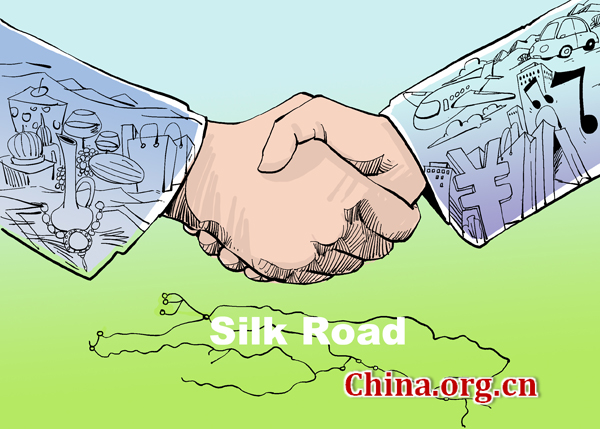Key strategic significance of One Belt and One Road
- By John Ross
 0 Comment(s)
0 Comment(s) Print
Print E-mail China.org.cn, March 5, 2015
E-mail China.org.cn, March 5, 2015
|
[By Gou Ben/China.org.cn] |
The willingness of smaller economies to create links with these larger continental scale economic hubs in turn reflects the fact that these smaller economies by themselves cannot achieve the scale of production required for the most efficient operation in a modern economy. The "win-win" outcome is therefore that the continental scale economic hub benefits from expanding further its scale of participation in global division of labor, while the smaller economies benefit from their increased links with a larger economy. This "win-win" outcome is what leads to the mutually beneficial closer links between the smaller and larger economies. Isolation from such trends leaves smaller countries unable to benefit from the developing global division of labor, with negative consequences for their own growth.
China's new Silk Road initiatives therefore should not be seen in isolation but as part of the overall global trend. China has the advantage of being a "continental scale" economy, but for success even this requires economic integration with geographically surrounding economies. In turn these smaller surrounding economies benefit from their relation with China's continental scale economy. This creates a win-win outcome even when there is no intention in Asia to follow the EU route of political integration – equally there is no move to political integration of Canada or Mexico with the United States. Such economic relations therefore form part of what Xi Jinping termed "a new model of international relations featuring cooperation and mutual benefit."
But to sustain these economic links, not only legal initiatives, such as free trade areas and tariff reductions, are required but also the creation of material infrastructure to facilitate trade and growing international division of labor. This is why China's One Belt and One Road is necessarily accompanied by initiatives such as the Asian Investment Infrastructure Bank (AIIB).
A specific and key strategic issue in this process will be that Asia is unusual in containing not one but two such continental scale economies – China and India. For this reason relations between China and India will play a key role in the 21st century – and it is of particular importance that India has both welcomed China's initiatives and become a participant in the AIIB.
Such economic realities of the tendency to create "continental scale" economies also explain processes in other parts of the world economy and have clear geopolitical consequences. For example the last period saw notable increases in intra-Latin American trade, with this eroding or replacing the previous entirely dominant bilateral trade between individual Latin American states and the United States – with China also replacing the United States as the largest trade partner for a growing number of Latin America countries. Similarly, although at an early stage, attempts in Africa, strongly supported by China, to lay the infrastructural basis for a more integrated "continental African" economy lead in the same direction.
Countries outside such evident continental scale units therefore face major choices.
? Recurrent political crises in Japan may be understood in significant part as the clash between an orientation to China's "continental economy," with which it would be economically rational for Japan to develop the closest possible ties, and Japan's military and political ties to the U.S. "continental economy."
? Australia attempts to resolve tensions between its dominant economic relations with China and its military and political ties with the United States.
? The U.K.'s regular political crises in relations with the EU, constitute the contradictory tensions of its relations with the continental scale economies of the United States and EU.
Countries in Southeast Asia, similarly, face important choices between the continental scale economy of China, which forms the economic center of the Asian region, and non-Asian states – particularly the United States. Some, for example the Philippines, currently attempt to resolve this through subordination to the United States. Others, such as contemporary Indonesia, attempt to balance various trends through a "non-political" stance. Some, such as Thailand, have experienced internal differences on the issue.
China is in the fortunate political position that it faces no such choice. China's fundamental strategy for national renewal continues to be to build up its own continental economy. But this, in turn, requires building mutually beneficial relations with its surrounding neighbors.
It is clear for these reasons why the One Belt and One Road is not a short term initiative but of such major strategic significance for both China and its neighbors.
The writer is a columnist with China.org.cn. For more information please visit: http://china.org.cn/opinion/johnross.htm
Opinion articles reflect the views of their authors, not necessarily those of China.org.cn.






